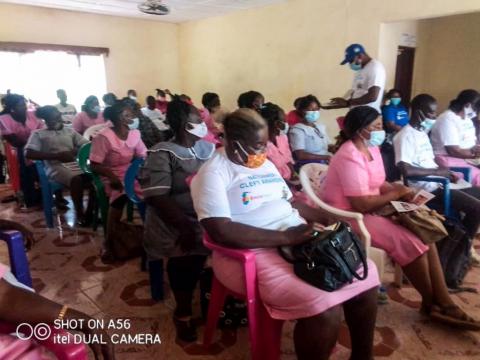By Prince J Musa in Kenema
The District Health Management Team (DHMT) in Kenema has conducted a lecture on cleft palate deformities for nurses and other health workers in the district to coincide with a nationwide awareness campaign on cleft illness.
The District Medical Officer Kenema, Dr. Donald Samuel Grant explained to the workers from 132 Peripheral Health Units in the district about the stigma the families and children with cleft lip and palate deformities face in the communities they live. Dr. Grant said cleft palate is an opening or split in the upper roof of the mouth of a child from birth, with cleft lip being a split on the upper lip. He described the two conditions as incomplete development of the facial structure of the newly born baby.
He said the male child was more likely to have cleft lip but without cleft palate while cleft palate is common amongst female babies. Dr. Grant stated that the problem can be detected from the muscles of the soft palate which is at the back of the mouth covered by linings. He said cleft can lead to difficulty in the baby swallowing food, with liquid foods likely to come out through the nose which is known as nasal spreading and can lead to chronic ear infection.
The district medical officer also explained that cleft issues occur when the tissues of the baby’s face and mouth don’t fuse properly and that researchers have proven that most of the cases of cleft lip and cleft palate are caused by an interaction of genetic and environmental factors.
Dr. Grant pointed out that some of the causes can’t be discovered and some mothers and fathers do pass on the genes that cause cleft.
Some of the risk factors include cleft lip family history and pregnant women who smoke cigarettes, drink alcohol or consume prohibited medicines. He said evidence has shown that babies born to obese mothers may have increased risk of cleft lip or palate.
Babies born with cleft are also prone to hearing and speech problems and dental issues. Dr. Grant advised the health workers particularly nurses to check every new born baby at their facilities for some period before discharging them and that they communicate with the lactating mothers and pregnant women constantly.
The doctor said any child 0-5 years identified with cleft problems in the community should have their details taken including photos, with the full consent of family members. The information is to be forwarded to the DHMT which can then evaluate the situation and decide on the possibility of transferring the patient to Freetown.
The district health sister Janet Tenneh Sankoh said a lot of children especially those in remote villages have suffered from discrimination because of the unusual facial form and some have dropped out of school due to fear of taunting and called on her colleague nurses to serve as mothers in identifying some of the affected children.
According to officials, a medical doctor from Sierra Leone has been sent overseas to specialize on cleft palate surgery.
Copyright © 2021 Politico Online








